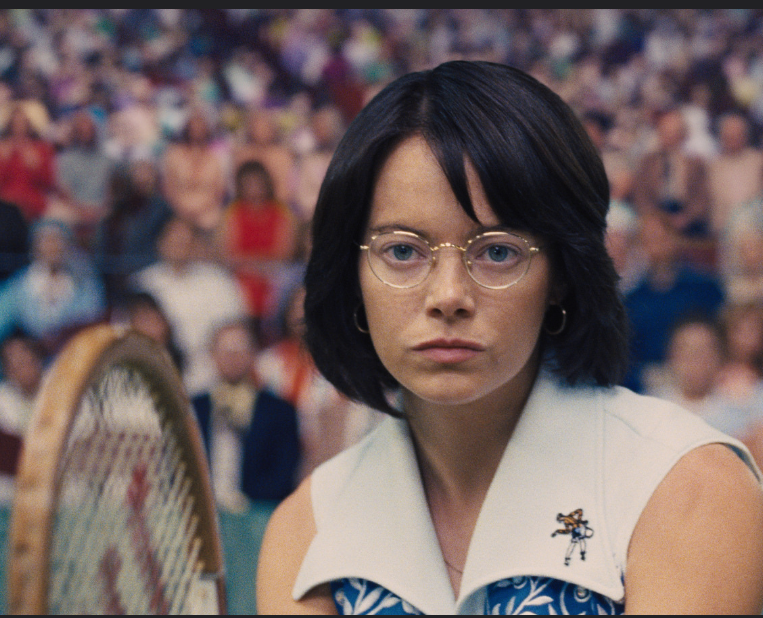
Billie Jean Beats Bobby: Watching Battle of the Sexes in Trumpian Times
Of course, the climactic match itself is a feel-good sequence. The viewer knows that Billie Jean, with her skill and her true grit, ultimately triumphs, so even when she gives up a few points to Riggs we can rest assured that all will go well on this court. That knowledge helps us to cope with the galling Jack Kramer (Bill Pullman), a tour promoter who tries to bully Billie Jean and her posse into accepting much less prize money than male players receive when they win tournaments. Watching this suave pig in a power suit along with the gambling clown Riggs sweat and ultimately lose is a feminist delight. And although the match itself was couched as a battle between the sexes, the film makes clear that Billie Jean is pro-women’s tennis and anti-chauvinist rather than anti-men. Her pre-match gift to Bobbie of a live piglet underscores this point
Sarah Silverman as Gladys Heldman, the tennis promoter who established the Virginia Slims Championships for women, is another delight. Her campy posturing, with sponsored cigarette in hand, belies the seriousness with which she shepherds the female players who were risking all by refusing discriminatory treatment. When she and Billie Jean crash Kramer’s club to confront him, one of his cronies insists that they’re not allowed in that space. Retorts Silverman, “Why? Because I’m a woman? Or a Jew?” Another moment sure to register on Jewish feminist radar occurs when Riggs is watching television and can’t get Rhoda Morgenstern and Mary Tyler Moore off his screen quickly enough.
Throughout the film, Billie Jean is in the process of coming out to herself through the confusingly delightful erotic distractions of Marilyn Barnett, a hair stylist who turns a trim into sensual cinema (the film doesn’t mention Barnett’s palimony suit in the 1980s that publicly outed Billie Jean King and resulted in her losing both privacy and endorsement contracts). Brilliantly cast as a queer tennis dressmaker, Alan Cumming is the first to recognize that Billie Jean and Marilyn have become lovers. He uses his gaydar to warn Billie Jean about the inopportune arrival of her husband, Larry. After she wins the match against Riggs, Cumming hugs her and assures her that eventually they will win the battle of love.
Archival footage shows many celebrities—including Chris Evert—predicting a win for Riggs. A notable exception is Rosey Grier, former football player and the one who tells boys that it’s okay to cry in Marlo Thomas’ feminist children’s classic It’s Okay to Be. . . You and Me.
Battle of the Sexes makes it okay for Billie Jean to shed tears of relief and victory in the locker room after the match (although this didn’t happen in real life, King approved of the scene because it captured her state of mind at the time). As Adrienne Rich has written, “There must be those among whom we can sit down and weep, and still be counted as warriors.” Battle of the Sexes definitely counts Billie Jean King as a weeping warrior. Perhaps returning to the battles of the 1970s in 2017 can give us some of the hope, strength, and insight we need to beat the contemporary pigs in suits as well as those who carry torches.
Helene Meyers is Professor of English and McManis University Chair at Southwestern University. She is the author of Identity Papers: Contemporary Narratives of American Jewishness and Reading Michael Chabon. Her more journalistic writing has appeared in Lilith, Forward, Tablet, Ms. Magazine’s Blog, the Washington Independent Review of Books, Inside Higher Education, and the Chronicle of Higher Education. She is currently writing a book on Jewish American cinema.
The views and opinions expressed in this article are the author’s own and do not necessarily reflect those of Lilith Magazine.



